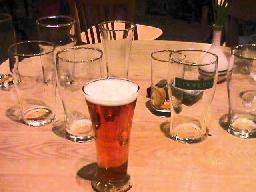I don't espouse any particular energy policy, "Carbon Tax", trading arrangement or whatever. I don't know enough about all the particular policies to have serious opinions on them. I'm pretty much in agreement with the "polluter pays" principle, and I accept the reality of "liberal democratic" government. At the same time, while not being simplistically anti-capitalist, I'm aware that capitalism doesn't necessarily well serve the general good. I know that national governments aren't world governments, but they are governments in the world.
I'm not convinced that taxation (per se) is necessarily bad for an economy. Perhaps some taxes are bad (counter-productive / above revenue maximising rates / squandered / etc).
I have (on the twitter) posted links to interesting documents on Carbon Emissions, Climate Change and what might be done about it. Most recently:
"Bridging Emissions Gap for 2C Target Do-able bit.ly/uJKBXS , but we couldn't be bothered. Sorry kids. Daddy broke the world."
(The reference is to a report by the United Nations Environment Programme)
The point I was trying to make is that it appears that the 2°C target is technically achievable; however, politically (even given the success(?) in Durban http://www.bbc.co.uk/news/science-environment-16124670) it looks a bit unlikely - to say the least.
Obviously, here at Stringers, we're interested in the Climate Change and Emissions thang. We're somewhat interested in Fossil Fuel Dependence, and stuff like that. We're very interested in Autonomy, which is why we we feel we should internalise our true energy costs, as far as possible, ourselves - hence our 100% renewably powered position (for which we pay a small premium). We don't wait for The Man to force us to do the Right Thing.
Anyhoo, the main point leveled against me (by @GreatHeckBrew), as far as I can figure it, is that
"carbon reduction policies of European governments are well intentioned but counterproductive. They increase global emissions"ie. it's suggested that EU policies transfer emissions to the developing world, resulting in a net increase in Carbon emissions. The mechanism proposed seems to be that the burden of EU policies on EU based business impairs competitiveness, so dirty (less regulated) developing world industries gain an advantage and expand.
Now, to "prove" that EU policies leads to an overall transfer of emissions to the developing world (or as we might say, "Exports Emissions"), you'd need to, as a minimum, show two things:
- Emissions are exported (overall).
- This is due to EU policies.
I'm not aware that this has been done.
30 Dec 2011:
Right, nothing from my "attacker" (golly) so that's a "shut up" having failed to "put up" thing.




















